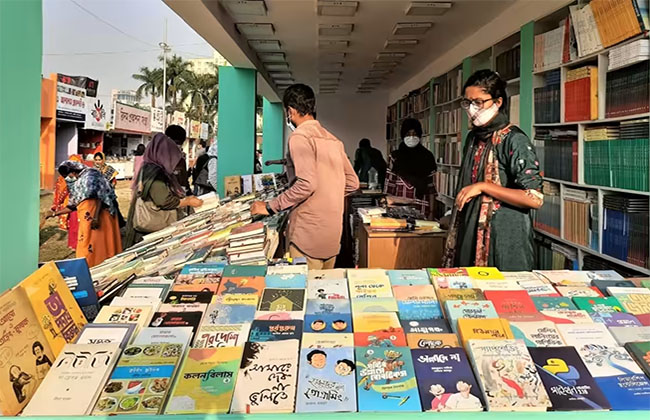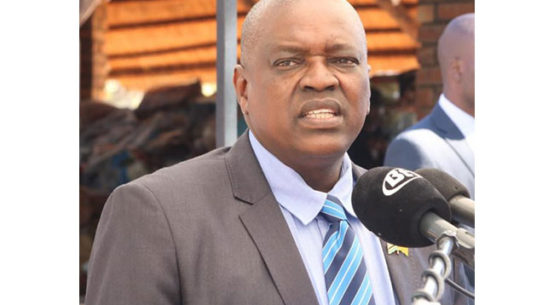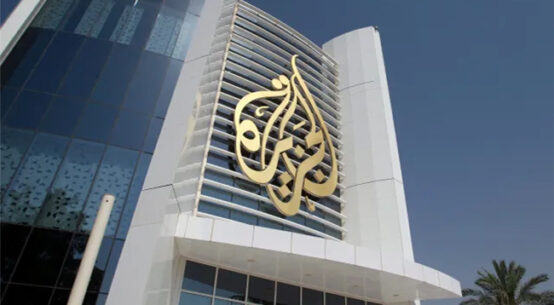
Bangladesh’s largest book fair is poised to bar a prominent publisher known for releasing works by dissident writers, in what critics say is the latest sign of intensifying pressure on opponents of the government.
Adarsha Prakashani, whose name roughly translates to Ideal Publisher, is set to be left out of the monthlong Ekushey Book Fair, which starts Wednesday. Bangla Academy, the state-run institution that promotes Bangla language and literature and organizes the event, determined that some books from Adarsha contain “elements” that go against its policies and regulations.
Muzahidul Islam, a director of Bangla Academy, told Nikkei Asia that it had received an “objection about some books” published by Adarsha without revealing which ones or who protested. After “internal scrutiny, we decided to not allow the books and their publisher to have a stall in the book fair,” said Islam, also the member secretary of the Book Fair committee.
Adarsha, owned by Mahbub Rahman, since 2020 published at least three books that are highly critical of the government of Prime Minister Sheikh Hasina, written by popular authors living abroad. Two question the government’s narrative of continuous development under Hasina, which the authors allege is based on fabricated data. The other dissects Bengali identity and the nationalism propagated by Hasina’s political party.
This is not the first time a government organ has apparently sought to quash books. But previously the focus was typically on volumes accused of insulting religion or containing extremist ideas. This time, some critics say denying an entire publishing house space at the fair is even more heavy handed than banning any particular book.
The move also comes against a fraught political backdrop, with the opposition late last year staging large protests and calling for Hasina to resign, while the government was accused of a violent clampdown on free expression. The government denies stifling dissent.
“I learned [of the ban] when I shockingly found out that Adarsha’s name wasn’t there on the academy-prepared list of publishing houses that got stalls,” Rahman said.
Rahman said two different Bangla Academy officials eventually confirmed to him off the record that during an internal meeting the Book Fair Committee had decided to bar Adarsha over the three books, the titles of which translate to “Development Mirage,” by Zia Hassan, “Unimaginable Narrative of Unstoppable Development,” by Faiz Ahmad Taiyeb, and “In Search of Bengali’s Mediocrity,” by Faham Abdus Salam.
A Bangla Academy official who requested anonymity gave a similar account when contacted by Nikkei Asia.
Rahman held a news conference on Jan. 19, attracting attention on social media. That prompted Bangla Academy to issue a statement that mentioned only one book, Salam’s, which it said included lines that were “obscene,” “distasteful” and “sarcastic,” and which are not protected under the constitutional guarantee of free speech.
Bangla Academy has signaled that it would reconsider giving Adarsha a stall if it does not sell books deemed questionable. Rahman insisted to Nikkei Asia that he would stand up for free expression. “I sell books, not groceries,” he said. “I can’t compromise on my belief. I will wage a legal battle against the ban.”
Salam, however, on Facebook urged Adarsha to give in and not display his book. Some argued having a stall would be the best way to promote free expression. It was unclear whether keeping such books away from the fair would be enough to win a reversal of the ban.
A presence at the Ekushey Book Fair is crucial for publishers. Adarsha says at least 30% of its annual revenue comes from the event. (Photo courtesy of Mahbub Rahman)
Salam, who lives in Australia, told Nikkei that the government just wanted to send a message to the publishers “to not publish books written by dissenters.” Germany-based Hassan said the ban is further evidence that the regime “only tolerates views that support its narrative. and will use any means to suppress views that question its legitimacy.”
During Hasina’s decadelong rule, global watchdogs have criticized the government for constraining free expression. In last year’s World Press Freedom Index, prepared annually by Reporters sans Frontieres, Bangladesh ranked 162nd out of 180 countries, the worst in South Asia.
“The banning of Adarsha from the country’s leading book fair highlights the increasingly shrinking space for critical writers and others to express themselves,” Josef Benedict, a researcher at Civicus, a global alliance that aims to strengthen civil society. “The climate of censorship has escalated many times under the Sheikh Hasina regime.”
Censorship can backfire, however. News of the ban on Adarsha sparked a Facebook campaign, through which a large number of mainly Bangladeshi expatriates have been snapping up the three controversial books.
Nazmul Ahasan, a San-Francisco based Bangladeshi journalist who helped kick-start the campaign, said that by purchasing the books for distribution to others, he hoped to “pose a symbolic resistance to a nonsensical act of government suppression.”
Shafquat Rabbee, a Dallas-based university professor who has also used crowd funding through Facebook to buy the books and distribute them to his social media followers, noted that Adarsha itself was not outlawed and the books were not banned. But as the authorities denied the publisher access to the most lucrative festival, where millions of dollars in sales are made, he said he was doing it so that Adarsha “gets some business, and the books send their message across.”
Rahman appreciates the support but is worried about the other 300 writers he publishes and the impact on his business.
“At least 30% of our yearly revenue comes from the fair,” he said, adding that veteran and new authors alike may be reluctant to publish with him in the future for fear of missing out on the event.
(Republished from Nikkei Asia)




